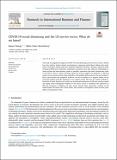DSpace Repository
COVID-19 social distancing and the US service sector: What do we learn?
- DSpace Home
- →
- Web Of Science
- →
- Web Of Science
- →
- View Item
JavaScript is disabled for your browser. Some features of this site may not work without it.
| dc.contributor.author | Gunay, Samet
|
|
| dc.date.accessioned | 2024-03-29T06:44:56Z | |
| dc.date.available | 2024-03-29T06:44:56Z | |
| dc.date.issued | 2021 | |
| dc.identifier.issn | 0275-5319 | |
| dc.identifier.issn | 1878-3384 | |
| dc.identifier.uri | http://hdl.handle.net/11547/11449 | |
| dc.description.abstract | This study investigates the impact of COVID-19 social distancing on the US service sector. Results from four industry indexes (hotels, entertainment, restaurants and airlines) indicate that conditional correlations among index pairs exhibited substantial increases. Iterated Cumulative Sums of Squares (ICSS) tests in dynamic conditional correlations show that while the relationship between airlines and entertainment venues is unstable, restaurants and hotels demonstrate stable co-movement. Markov regime-switching regression analysis suggests the pandemic is affecting mainly the entertainment and airline industries, with gradual deterioration in the hotel industry, led by small-market-cap companies. However, we see no evidence of a negative impact on the restaurant industry from the pandemic in our analysis period. This may be related to Maslow's hierarchy of needs. Based on our results, we recommend employment of effective working capital and supply chain management methods in the service sector to streamline the operations of affected companies. In addition, all other sectors should utilize appropriate methods of risk measurement and should take 'Black Swans' into account to incorporate a more accurate probability of unexpected events. | tr_TR |
| dc.relation.ispartofseries | 56; | |
| dc.title | COVID-19 social distancing and the US service sector: What do we learn? | tr_TR |
| dc.type | Article | tr_TR |
Files in this item
This item appears in the following Collection(s)
-
Web Of Science [942]
